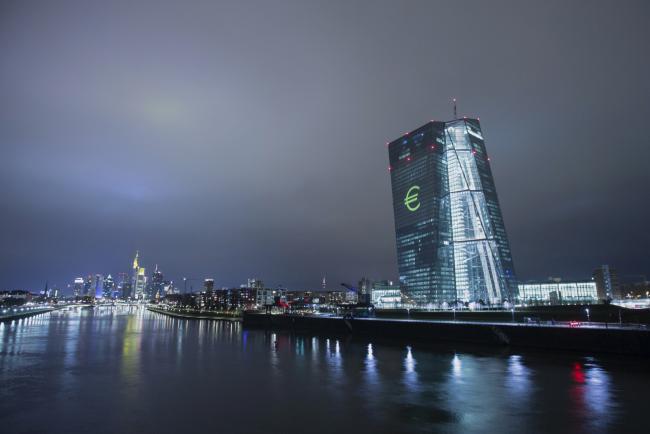(Bloomberg) -- It’s been a week of dovish turns at central banks, as officials in Europe unleashed more stimulus, while their peers in the U.S., Canada, U.K. and Australia indicated they are in no hurry to raise interest rates.
Meanwhile, forecasters across the world are downgrading their view of the economic outlook, and growth was very much in focus at this year’s meeting of China’s top legislative body.Check back later on Friday for U.S. nonfarm payrolls data, which probably will show that employers added about 180,000 workers last month after 304,000 in January, while the jobless rate fell a tenth of a point to 3.9 percent — near the lowest rate since 1969.
Here’s our weekly wrap of what’s going on in the world economy.
Rise of the Doves
The European Central Bank delivered the week’s biggest — and most concrete — dovish shock, delivering a fresh round of monetary accommodation in a bid to shore up the weakening economy. The Bank of Canada diluted its conviction that interest rates will need to go higher amid an uncertain outlook, and New York Fed President John Williams (NYSE:WMB) said the Federal Reserve can afford to “wait” and watch incoming data. In Australia, where the economy has experienced its worst six-month period since the global financial crisis, central bank Governor Philip Lowe said it’s hard to envision a scenario for raising rates this year, while two Bank of England officials, including the usually hawkish Michael Saunders, indicated they are in no hurry to tighten policy amid the fog of Brexit.
Read more:
- Central Banks’ ‘Embrace’ of Markets May Be Complicating Policy
- New Normal for Europe’s Central Bankers Is Getting Kicked Around
- Turkey Prolongs Rate Pause Before Elections as Easing Grows Near
Forecasts Cut
A key reasoning behind the renewed dovishness of central banks lies in the souring economic picture — a concern emphasized by yet more downgrades to the outlook this week. The ECB cut its growth forecast by the most since the advent of its quantitative-easing program, while, in a gloomy report, the OECD slashed its own predictions, and warned that worse may be ahead.
News from around the global economy continues to disappoint: Factory reports from South Korea and Taiwan added to a souring in sentiment across Asia, and U.K. data showed more signs of Brexit strain. It wasn’t all bad news though: Italy’s economic contraction at the end of last year was less than first estimated, the euro area’s services sector rallied and productivity gains in the U.S. last quarter exceeded forecasts.
Read more:
- America’s Job Market Is Defying Employer Labor Shortage Reports
- Italy in the Danger Zone Alarms Rest of Europe a Year After Vote
- Japan Inflation Barometer Points to Zero Price Growth by Summer
China Outlook
The economic gloom extended to China National People’s Congress where the nation announced it was lowering its its goal for growth. The target released in Premier Li Keqiang’s annual work report was set at a range of 6 to 6.5 percent for 2019 – a shift from last year’s “about” 6.5 percent goal – with the lower bound of the target representing the slowest pace of growth in almost three decades. The gathering also saw the unveiling of a major tax cut, as policymakers seek to pull off a gradual deceleration while grappling with a debt legacy and the trade standoff with the U.S.
In more promising news, two people familiar with the discussions said the U.S. and China are close to a trade deal that could lift most or all U.S. tariffs as long as Beijing follows through on pledges ranging from better protecting intellectual-property rights to buying a significant amount of American products. In the meantime, U.S. President Donald Trump set his sights on India and Turkey, announcing he plans to end key trade preferences for the two countries.
Read more:
- China’s Economy: Five Things We Learned at Xi’s Policy Summit
- Trump and Xi Are Close to a Deal, But the Trade War Isn’t Over
- CHINA REACT: Pragmatic Growth Target (NYSE:TGT), Sensible Economic Aid
Weekend Reading
- Tariff-Man Trump to Preside Over $100 Billion Jump in Trade Gap
- Nobody Knows How Dubai’s Economy’s Been Doing Lately
- One of the World’s Most Valuable Banknotes Just Got a Face Lift
- The No-Deal Diet: How Brits Would Eat If Brexit Shuts Off Trade
- U.S. Gamers Are Drawn To and Threatened By China. Trump May Help
- Some Key Ideas Behind MMT, the Theory Everyone’s Talking About
- Evidence Grows That Trump’s Trade Wars Are Hitting U.S. Economy
- The Big Corporate Tax Cuts Were a Lot of Huff for a Little Puff
- Some Key Ideas Behind MMT, the Theory Everyone’s Talking About
Chart of the Week
From New York to London: Here’s Where to Spot the Super Rich

